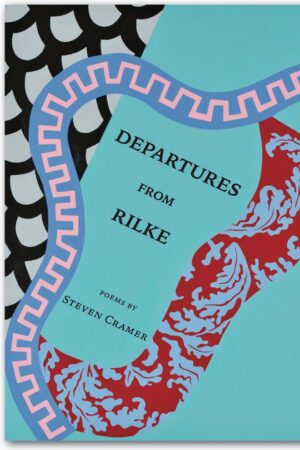Departures from Rilke: Poems
by Steven Cramer
reviewed by Ann Leamon
In this fascinating poetry collection, Steven Cramer’s seventh, the prize-winning poet and essayist takes on a formidable challenge: updating in English the sensibility of Rainer Maria Rilke’s first great works, New Poems (1907) and New Poems: The Other Part (1908). Rilke, the Austrian poet acclaimed for his idiosyncratic and mystical verse, wrote in German, a language that invents words by stacking modifiers atop nouns. While lending a magic elusiveness to the originals, this construction confounds elegant English translation.
Cramer explains that his “departures” “bear some family resemblance to Rilke’s original” even though “the most wayward of them desert Rilke’s premses almost altogether.” Relying on various translations and even Google Translate, Cramer vaults Rilke’s work over the intervening century and delivers a selection of poems that are more modern than their originals yet retain Rilke’s intoxicating combination of ethereality and physicality.
Much of this collection considers aging, death, and what comes afterward. From the start, the reader is almost overwhelmed. The first poem, “The Prodigal Son”—one of the few with a Biblical theme—begins:
To escape all of this gaping chaos
you can’t see, the way standing water
reflects your face and clouds it;
and ends as follows:
“To take all that on, like a bad debt, then
default, the questions dead on your lips.And begin again?”
The reader emerges from desolation to an unexpected invitation, like a body surfer from a wave, tumbled and wobbly after the onslaught of images. You’re not certain where you’re going, but you know it will be a ride.
In this collection, Cramer addresses very modern concerns. “The Alchemist” explores our vain trust in transformative science:
“the [lab geek] sees his base metals flee
back onto God’s scales, leaving him
behind: a muttering, drunken miner,
panning for gold in a dry creek bed.”
“Immigrant Family” considers our attitudes toward immigrants, concluding with the startling line: “suddenly a hand thrusts out— / do you take it if you don’t know whose it is?”
In this volume, we spend lots of time with death. The second poem, “Olive Country,” recounts the plea of Jesus in Gethsemane and the implacable reply (“Pray for an angel and no angel comes / without the night to wrap around itself”). These lines echo Rilke’s famous invocation in the Duino Elegies:
Who, if I cried out, would hear me among the Angels’
Orders? and even if one of them pressed me
suddenly to his heart, I’d be consumed
in his more potent being.(trans. Edward Snow)
Humans are then compared to other creatures with unhappy fates, a caged panther and even a duck:
The work that’s doomed to stay undone—
that type of work walks like a duck walks.Same with death: we stroll the Earth,
age after age, then shuffle off, like a duck
The themes of aging, loss, and death recede, reemerge, and weave together as time spins from the Biblical to World War I to 1944 to the present. “A Photograph of My Father’s Twin” stacks loss on loss:
one hand rests on a holster clipped
to its pistol belt; the other so at ease
it appears to vanish, as if the first
to grasp what’s waiting in the future.
Everything else about him lies hidden
in a sienna tint so deep, I can’t tell
who this disappearing soldier is.
The picture fades in my fading hand.”
In subsequent poems, mothers die, sisters die, love dies. But not all is death and disintegration. In “Electric Guitar,” a poem that Cramer notes runs “far afield” from Rilke’s “Die Laute” (“The Lute”), he meditates on the electricity and vibrancy of love:
Plenty other muses teased voltage from my pickups,
but the duende she awoke could play, until who knew
whether I fed back through her or she through me?
Love of family animates several other pieces, even when they’re infused with a sense of imminent loss. “Lullaby” starts hauntingly:
How will you sleep when I’m dead?
Without my arms, like linden branches,
creaking as my trunk twists, dreaming?
The linden trees rustle with Rilke’s ghost. “Charlotte Reading, 2005” and “Photograph of Ethan Looking at a Globe, 1999” both depict children in their infinite mutability and elusive potentiality while the titles evoke nineteenth-century paintings. The last poem, “Zeus,” considers both the god and, we learn in the afterword, the poet’s dog, echoing Rilke’s tendency to commingle the sacred and quotidian.
These poems require multiple readings to bring their meanings into focus—not unlike the Rilke originals from which they depart. They’re multifaceted and haunting, full of tantalizing allusions that require mental tugging to resolve. I would have liked the afterword to be a preface, to better prepare the reader for the vision behind the work. In that section, Cramer explains how the collection grew out of conversations with his wife as he toyed with multiple versions of Rilke’s poems to give them a more modern sensibility. That insight revealed the project’s audacity and replaced my initial frustration with amazed delight. I recommend this collection, with the caveat that one should start with the afterword to stabilize the kaleidoscopic imagery and provide a framework for the concept’s expanse and invention.
Published on January 11, 2024

